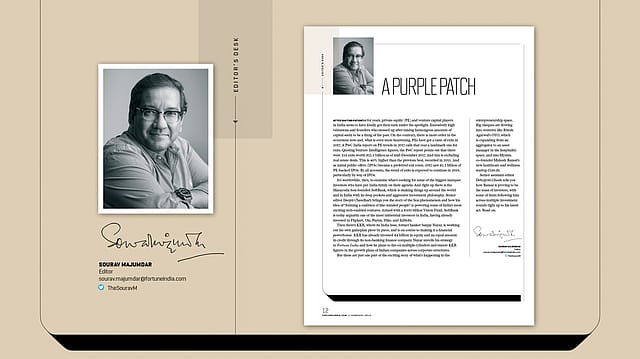A purple patch for investors
ADVERTISEMENT

After waiting patiently for years, private equity (PE) and venture capital players in India seem to have finally got their turn under the spotlight. Excessively high valuations and founders who messed up after raising humongous amounts of capital seem to be a thing of the past. On the contrary, there is more order in the ecosystem now and, what is even more heartening, PEs have got a taste of exits in 2017.
A PwC India report on PE trends in 2017 calls that year a landmark one for exits. Quoting Venture Intelligence figures, the PwC report points out that there were 259 exits worth $12.5 billion as of mid-December 2017. And this is excluding real estate deals. This is 40% higher than the previous best, recorded in 2015. And as initial public offers (IPOs) became a preferred exit route, 2017 saw $1.2 billion of PE-backed IPOs. By all accounts, the trend of exits is expected to continue in 2018, particularly by way of IPOs.
It’s worthwhile, then, to examine what’s cooking for some of the biggest marquee investors who have put India firmly on their agenda. And right up there is the Masayoshi Son-founded SoftBank, which is shaking things up around the world and in India with its deep pockets and aggressive investment philosophy. Senior editor Deepti Chaudhary brings you the story of the Son phenomenon and how his idea of “forming a coalition of like-minded people” is powering some of India’s most exciting tech-enabled ventures. Armed with a $100 billion Vision Fund, SoftBank is today arguably one of the most influential investors in India, having already invested in Flipkart, Ola, Paytm, Hike, and InMobi.
Then there’s KKR, where its India boss, former banker Sanjay Nayar, is working out his own gameplan piece by piece, and is on course to making it a financial powerhouse. KKR has already invested $4 billion in equity and an equal amount in credit through its non-banking finance company. Nayar unveils his strategy to Fortune India and how he plans to fire on multiple cylinders and ensure KKR figures in the growth plans of Indian companies across corporate structures.
But these are just one part of the exciting story of what’s happening in the entrepreneurship space. Big cheques are flowing into ventures like Ritesh Agarwal’s OYO, which is expanding from an aggregator to an asset manager in the hospitality space, and into Myntra co-founder Mukesh Bansal’s new healthcare and wellness startup Cure.fit.
Senior assistant editor Debojyoti Ghosh tells you how Bansal is proving to be the toast of investors, with some of them following him across multiple investment rounds right up to his latest act.
The Fortune India February 2018 issue is on stands. Subscribe here